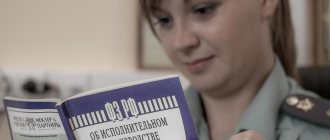Conditions for imposing a penalty
Bailiffs have the right to withdraw money from a bank account if enforcement proceedings are underway against the debtor to repay the debt. If such a write-off occurs without warning for the debtor, then most likely he did not notify the bailiffs of his location and contacts. Because the bailiffs must inform the debtor about the commencement of enforcement proceedings and, then, about issuing a writ of execution to the recoverer or sending it to the bank. Moreover, such a procedure is mandatory, but solely of a notification nature, that is, the bank does not require consent from the debtor to write off the debtor’s bank card. Failure of the debtor to receive the writ of execution will not be grounds for filing a complaint against the actions of the bailiff if he actually sent the writ to a known place of residence.
Did the bailiffs withdraw money from your salary card?
We will consult on this issue for free!
+7
How to avoid blocking funds?
What should you do to avoid blocking your card by bailiffs? These tips may seem strange to some, but to prevent your funds from being blocked, you need to:
- First, avoid the formation and accumulation of overdue debt. Overdue debt leads to legal proceedings with all the ensuing consequences. And the consequences are that you are suddenly left without money.
- Secondly, if due to various life situations (loss of job, unforeseen large expenses) you are still late in making payments on your debts, then you do not need to ignore calls and letters from the bank, and from other creditors. There is a possibility of agreeing on an installment plan to repay the debt, because the consideration of the case in court will take a certain, not the shortest, time.
- Thirdly, if the first two options did not work and you are sued, you do not need to ignore it. There are legal ways to “delay” the consideration of a case, reduce the penalty, and obtain a deferment or installment plan for the execution of the decision. In addition, by providing information to an employee of the FSSP of the Russian Federation about the availability of salary, social or credit cards, you can avoid blocking them or illegally debiting funds from them.
- Fourthly, no one forbids you to withdraw money before your accounts are blocked, of course, if you have time to do so. The method is not entirely “correct” from the point of view of the law. But he will not let you die of hunger or end up on the street, in case you are renting housing.
- Fifthly, feeling that “debts are burning,” you can abandon all cards. With a legal job and a white salary, this is difficult to do. But, knowing that the bailiffs are about to start hunting for your funds, it is better to “go in cash”.
Procedure for writing off money
There are the following procedures and rules that bailiffs must follow to withdraw money from a debtor’s bank card:
- Bailiffs search for the debtor, his property and bank accounts;
- They inform the debtor that they can withdraw his funds by sending him a writ of execution;
- Bailiffs can withdraw money only from one of the debtor's accounts; they can change the account to another by revoking the writ of execution and redirecting it again, also notifying the debtor about this. At the same time, accounts from which funds are not debited may be frozen to ensure the safety of funds while obligations are fulfilled;
- If there is not enough money on the card or account to fully comply with the bailiffs’ requirement, the writ of execution remains on the account, and the bank writes off the money as it is received until the entire debt is covered;
- Bailiffs have the right to collect only up to 50% of pensions and salaries to pay off debts (in some cases with alimony - up to 70%), but they do not see whether a salary or social account in a bank or a regular one, so illegal write-offs may occur if the debtor does not will inform you from which account you can withdraw money;
- Bailiffs can send a writ of execution to an account in any foreign currency, not only in rubles.
What is the difference between blocking a card and seizing it?
For an ordinary person, it’s all the same whether it’s will or whether it’s captivity. Both arrest and blocking of the card do not give a person the opportunity to manage his funds in a bank account: pay for purchases in the physical and virtual worlds, make transfers, withdraw money from an ATM. Sometimes it’s even impossible to buy a loaf of bread and a pack of cigarettes! Advice - think again about the benefits of cash in the house.
But there are still differences between arrest and blocking of a card.
Seizure of the card
is an interim measure with the help of which, at the initiative of the bailiff, the funds on the debtor’s card are completely or partially blocked. The debtor will no longer be able to manage the money on his card. In this case, money can be credited to the card account. She will receive both a salary and a transfer from relatives.
Card blocking
- this is a ban on all operations that were previously available using the card. You cannot pay with a card, you cannot withdraw cash from it. ATMs can keep such a card for themselves, in common parlance - “gobble it up”. Funds cannot be transferred to a blocked card - they will be returned to the sender.
Funds not intended for collection
Bailiffs cannot demand that the debt be closed using the following funds received on the card:
- As social benefits related to children, their birth, maintenance, as well as alimony received by a parent for children;
- Various social benefits and payments, for example, in connection with the loss of a breadwinner, funeral benefits and others;
- Benefits for military and law enforcement officials who have lost their ability to work while performing their official duties;
- Benefits for which the debtor purchases vital items, medicines, etc.
In order to avoid unnecessary withdrawal of money or withdrawal of money from amounts not intended for write-off, the debtor should notify the bailiffs in advance about the accounts he has and their purpose. Or agree with them and the prospector on the procedure and deadlines for independently repaying the debt and comply with them.
Refund
Bailiffs receive citizens two days a week. After waiting for the next appointment, I went to the required bailiff, showed my passport, in which the place of birth and registration address differed from those of the debtor. And he said that in a couple of days he would prepare a resolution to cancel the collection from my account. You will need to come get it and take it to the bank. It is interesting that documents on withdrawal of money are sent to the bank electronically, but documents on return must be submitted in paper form.
In general, I handed over the cancellation order to the bank, and on the same day all the money was returned. In theory, the whole issue could be resolved in a week, but in my situation it took almost a month. For more than two weeks I did not have the opportunity to get to the bailiff during reception hours for citizens.
By the way, the bailiff left me his cell phone number so that in case of further similar problems I could quickly contact him and solve them.
Refund of improperly written off amounts
If the bailiffs withdrew money that they did not have the right to write off, the debtor can take the following steps to return it:
- Request from the bank the details of the writ of execution and the name of the bailiff or recipient of the collected amounts, take a copy of the document on writing off the money. The bank is obliged to provide this information;
- Write an application to the bailiff service, to which attach documents confirming the collection of the amount, as well as the illegality of their collection;
- If the bailiffs left the complaint unanswered, the debtor has the right to go to court with a claim, also attaching to the application all documents confirming the grounds for the claim.
If there is a court decision recognizing the debt, a writ of execution, and there is no reason to consider the money on the card as benefits or other amounts not intended for collection, then the bailiffs have the right to send a demand to the bank to withdraw funds from the card account. The bank cannot fail to comply with this requirement, regardless of the consent of the account owner.
How can I find out why and on what basis money was debited from my account?
Our judicial system, in terms of debt collection, works like clockwork. The creditor goes to court with a demand to collect the debt from the debtor, receives a writ of execution or a court order and turns to the bailiffs or the bank where the debtor has a current account. If you contact the bailiffs, they issue a resolution to initiate enforcement proceedings and give the debtor five days to voluntarily repay the debt. If you contact the bank, the creditor has the right to recover the amount of debt from any accounts opened in the name of the debtor. As a rule, debtors learn that they have a debt only after funds are written off from the account or after receiving a decree to initiate enforcement proceedings. We will tell you in the article how to find out why money was written off from your account, how to find out the contents of a court order and appeal it in case of disagreement with the stated requirements.
How can I find out why money was debited from my bank account?
As we have already said, the bank can write off funds from the account if the creditor contacts the bank with a court order or other enforcement document. According to the Law “On Enforcement Proceedings,” the bank does not have the right to refuse to satisfy the creditor’s claims. If there are funds in the account, the bank writes them off in favor of the creditor.
If you see that money has disappeared from your account, we recommend following the following instructions to obtain information about the reasons for debiting:
- Contact the hotline of the bank where you have an account.
- Provide the date, time and amount of the debit, if you know this information.
- Request information about the reasons for writing off funds.
If the bank’s hotline cannot help you, then it makes sense to contact the bank branch where you opened the account, or simply go to the nearest branch and act in accordance with the following instructions:
- Show the bank employees your passport so that they can verify your identity and determine whether you are a client or not.
- Tell us about the circumstances under which you became aware that funds had been debited from your account.
- Provide the date, time and amount of the debit, if you know this information.
- Request information about the reasons for writing off funds.
Information on the grounds for writing off funds means the details of the writ of execution (writ of execution, court order or other writ of execution): series; number; date of issue; amount of claims; issuing authority. If the bank has a scanned copy of the writ of execution, ask them to print it for you to review.
If bank employees refuse to provide the specified information, write them a statement requesting information about the grounds for writing off the amount of money, indicating all the details of the writ of execution. The application will need to be written in two copies, on one of which the bank employee will put an acceptance mark (date of receipt, full name of the bank employee, signature, seal). Keep the application with the note of the bank employee for yourself. Within 30 days from the date of filing the application, the bank will have to give an official response to your request and explain why and on what basis the funds were debited from your account. If, after the specified period, the bank does not provide a response, we advise you to contact the bank directly and request a copy of the response to your application (if they previously sent it by mail).
Can debt be written off from a credit card?
The bailiffs and the bank in which the debtor's accounts are opened do not have the right to write off funds from the credit card to pay off the debt. If a write-off does occur, contact the bailiff with a request to return the funds to the credit account. In the application, indicate that the funds that were written off belonged to the bank and not to you.
Why were child benefits written off from my account?
In Art. 101 of the Federal Law of October 2, 2007 N 229-FZ “On Enforcement Proceedings” states that collection cannot be made in relation to benefits for citizens with children. If a write-off does occur, you must contact the bailiff with an application for a refund. Additionally, you will need to indicate that these funds are nothing more than child benefits.
How to find out on what basis the bailiffs initiated enforcement proceedings?
Depending on whether you received a resolution to initiate enforcement proceedings or not, the procedure for further actions will be different.
If you have not received a resolution to initiate enforcement proceedings, have not received a court order, and have learned about the debt after money was written off from your account, we recommend that you follow the following instructions:
- Find out information about debt on the website of the Federal Bailiff Service or on the State Services portal (registration is required). Information about debt available on these sites includes: Full name. debtor; Date and place of birth; number and date of initiation of enforcement proceedings; details of the executive document (type, date of adoption, number, name of the body that issued the executive document); the amount of outstanding debt; name, address and telephone number of the bailiff department, as well as full name. bailiff.
- Save the information received or print the site page. It may be useful to you in the future.
- Pay attention to the details of the writ of execution. It contains all the necessary information on what basis the bailiffs initiated enforcement proceedings. The following may serve as a writ of execution: a court order, a writ of execution, a resolution of a bailiff, an act of a body exercising control functions.
- Contact the bailiff department with a request to familiarize yourself with the materials of the enforcement proceedings.
- Familiarize yourself with the materials of the enforcement proceedings by photographing them.
How to find out the contents of a court order?
You can find out the contents of the court order in another way, without contacting the bailiff department. If you already know that the executive document by which funds were written off is a court order, then it is enough to follow these instructions:
- Contact the court that issued the court order with a request to familiarize yourself with the case materials (it is assumed that you have already found out the details of the writ of execution on the website of the Federal Bailiff Service or on the State Services portal).
- Familiarize yourself with the case materials by photographing them.
How to appeal a court order?
After reviewing the case materials and the court order itself, you can consider filing an application (objections) to cancel the court order.
Article 128 of the Civil Procedure Code of the Russian Federation.
Notifying the debtor about the issuance of a court order
The judge sends a copy of the court order to the debtor, who, within ten days from the date of receipt of the order, has the right to submit objections regarding its execution.
Article 129 of the Civil Procedure Code of the Russian Federation.
Cancellation of a court order
The judge cancels the court order if the debtor raises objections regarding its execution within the prescribed period.
From these legal norms it follows that the ten-day period for appeal begins to run from the moment the debtor receives the court order. If you have not previously received a court order and learned about the existence of a debt only after funds were debited from your bank card, then it is considered that the deadline established for the appeal has not arrived. The period will begin only after familiarization with the materials of the enforcement proceedings or court case.
How to write an objection to a court order?
- On the right side of the application write the name and address of the court. Next, fill out information about yourself as a debtor: Full name, address, contact phone number. Then indicate the available information about the claimant: Full name. (if the creditor is an individual), name of the organization (if the creditor is a legal entity) and address.
- Next, in the middle of the form, write the name of the document: “Application (objections) to cancel the court order.”
- Then, in the body of the document, outline the circumstances under which you became aware of the debt. Be sure to write when you received the court order.
- Next, you should indicate the grounds for canceling the court order. This could be for any reason. For example, disagreement with the accrued penalty, the calculation of the debt made by the collector, and any other arguments that, in your opinion, are grounds for the unconditional cancellation of the court order. In principle, you can limit yourself to only the sentence “I do not agree with the court order.” This will be enough, since the law does not oblige you to provide any compelling evidence to cancel the court order.
- Then write about the need to restore the deadline for canceling the court order. Although this deadline is not missed, at the same time, some judges require that in the application (objections) to cancel the court order, a petition for restoration of the missed deadline.
- After this, all that remains is to sign the application in copies and attach documents that confirm the date of actual receipt of the court order. If you wrote an application to familiarize yourself with the materials of the enforcement proceedings, then you can attach a copy of this application with a note from the bailiff department about acceptance.
- Register the application at the court reception and ask the court employee responsible for receiving correspondence to put an acceptance mark on your copy of the application. As a rule, the mark consists of the seal of the court reception, the application number and the signature of the employee. Using these identifying characteristics, you will be able to track the status of your application.
If the court considers that the deadline set for canceling the court order has not been missed, then a ruling will be made to cancel the court order. The court order will be canceled, and the claimant will be explained the right to go to court as part of the claim proceedings.
Sample application (objections) to cancel a court order
For greater convenience, we have prepared an application form for the cancellation of a court order. All you need to do is fill in the blanks, print it in duplicate and sign it. .
If you need help in drawing up documents for the court, you can place an order for drawing up a statement (objections) to cancel the court order or simply contact our consultant on the website.
debt collection money debt instructions court
How many times a month can bailiffs write off money from a card?
The fact is that it is not the bailiffs who write off money from the card, but the bank itself that transfers the funds that have just been transferred to the personal account. This will continue until your debt is paid off. It also depends on the content of the writ of execution, which was received for execution by the bailiff. For example, if a document is received about the collection of alimony payments, they are transferred, as a rule, monthly. If a single amount is indicated and it can be written off at once, the transfer will occur in one payment. There are also cases when the writ of execution specifies the specifics of execution, for example, payment by installments - then the write-off will be spread out in accordance with the writ of execution.
How and for what can you get arrested, blocked or debited from a bank card?
Everything is very simple here. You don’t even have to take your butt off the sofa. It is enough to first accumulate debts - for taxes, loan payments, housing and communal services, alimony or traffic police fines, etc. And then stubbornly and methodically ignore calls and letters. First from those to whom you owe. Then - from the collectors. Then - from the court and from the bailiffs.
And one fine day, when you make purchases, your plastic, or rather the funds on it, will be blocked. Or you can commit one of the illegal acts, the punishment for which is provided for in Section 8 of the Criminal Code of the Russian Federation (“Crimes in the economic sphere”).
How to prevent bailiffs from withdrawing money from a Sberbank card?
Here's what you need to do to prevent bailiffs from withdrawing money from your card:
- Before you apply for a Sberbank debit card, be sure to look in the terms of financial services for the clause under which you give your consent to the bank to write off money from your personal account (card) to pay debts, mandatory payments or commissions - you must refuse this immediately . This will not save you from a writ of execution, but it will help if your credit and debit cards are in the same bank (for example, Sberbank)
- If you have a card on which benefits, pensions, or any social payments are accrued, then in the event of an arrest, you can contact the bailiffs with a statement not to write off money from this card. To do this, you will need to contact the Pension Fund and get a certificate of enrollment, it will indicate the current account into which the funds are received. Based on this document, the bailiff will exclude her from security measures. This will only help those people whose bank cards are intended only for social payments.
Author of the article
How long should I wait for unlocking?
The card unlocking time consists of several components necessary for the following actions:
- crediting funds to FSSP accounts;
- making a decision to close enforcement proceedings;
- notification to the bank of the decision made.
After receiving official documents from the FSSP, Sberbank removes the imposed restrictions within 3 days. Usually this procedure takes 1-2 days. If the arrest is not lifted during this time, you must contact the FSSP, since the bank most likely did not receive the relevant documents from them.
Application for refund
Having in hand evidence of the illegal debiting of money from the Sberbank card by the bailiffs, an application is drawn up for the return of funds to the citizen’s account. The application process is completed as follows. In the right corner of the sheet the name and position of the head of the bailiff service is indicated. Further information about the applicant: full name, address, contact details. The text of the statement sets out the essence of the issue. It is important not to forget to indicate the number of the enforcement proceedings. Complete the description of the requirements with a list of attached documents. Under the text, put the signature of the applicant and the date of the application.
A sample complaint against a bailiff can be found
Required package of documents
To demand the return of money illegally debited by bailiffs from a Sberbank card, you must submit the following documents:
- Application for refund of written-off funds.
- Applicant's passport.
- Evidence that the bailiffs withheld the money illegally. This could be certificates from social security authorities that child benefits are transferred to this Sberbank card. Information about income or a document on termination of enforcement proceedings in connection with the reversal of a court decision. In general, any information confirming the legal basis for a refund.
Important
What to do if the debt is repaid, but the card remains unlocked:
- Contact the FSSP again for clarification whether the bank has received a resolution to unblock the account, and whether documents are required that will confirm the repayment of the debt;
- settle the debt issue with the creditor who initiated the collection of the debt. Receive written confirmation from him that there are no claims and provide it to the contractor.
If the process is delayed for unknown reasons, go to court to protect your rights.
If a card linked to a loan is seized
This case can be called extremely difficult and bad for a citizen. When issuing a loan, Sberbank also issues the borrower a debit card with which monthly payments are made: the client replenishes this card, the money is automatically debited on the appointed day.
If this card is seized, that is, driven into the red, the borrower will not be able to make the monthly payment. So it turns out: you want to pay the loan, but you can’t, and there is a risk of falling behind.
In this case, you should contact the servicing Sberbank as soon as possible and find out how you can repay the loan in this case. The manager will provide the loan account number; you will need to pay using it, that is, directly, and not through a card.
about the author
Irina Rusanova - higher education at the International East European University in the direction of "Banking". Graduated with honors from the Russian Economic Institute named after G.V. Plekhanov with a major in Finance and Credit. Ten years of experience in leading Russian banks: Alfa-Bank, Renaissance Credit, Home Credit Bank, Delta Credit, ATB, Svyaznoy (closed). He is an analyst and expert of the Brobank service on banking and financial stability. [email protected]
Is this article useful? Not really
Help us find out how much this article helped you. If something is missing or the information is not accurate, please report it below in the comments or write to us by email








